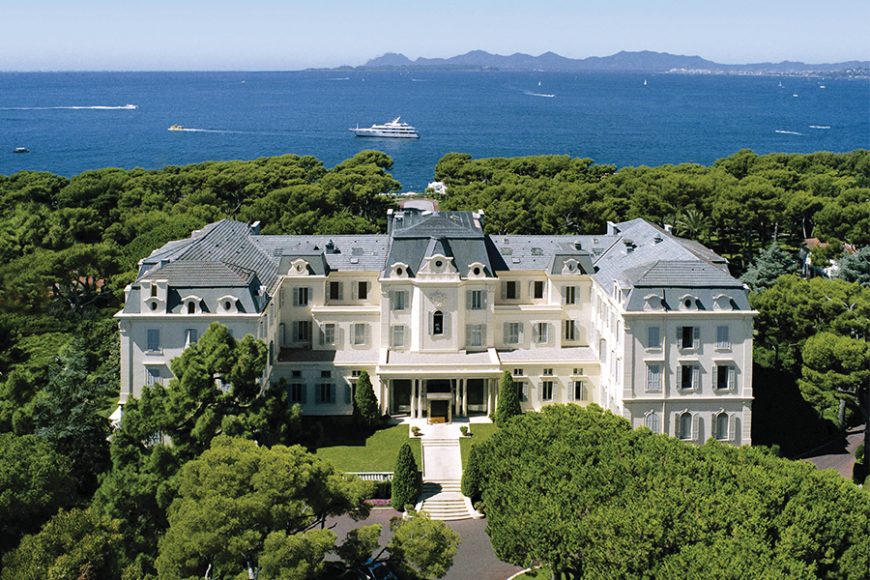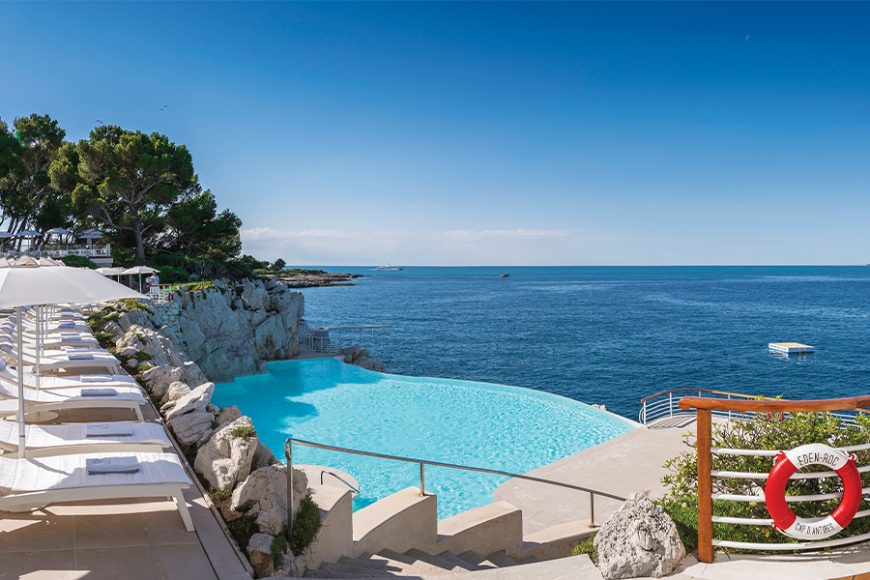If any hotel perfectly symbolizes the Jazz Age in Europe, then surely it has to be the Hotel du Cap-Eden-Roc. Nowhere did the ’20s roar more than at the hotel, magnificently situated in Cap d’Antibes on the French Riviera.
Mind you, it had all begun years earlier. When Cole Porter introduced those well-heeled, fun-loving sophisticates, Gerald and Sara Murphy, to F. Scott and Zelda Fitzgerald in Paris in 1920, and the foursome headed south to pursue their art and particular brand of self-destruction on the Côte d’Azur, Hotel du Cap was already 50 years old. The original house, the Villa Soleil, had been built as an artists’ retreat by the founder of (the French newspaper) Le Figaro in 1870, becoming a fully fledged hotel some 20 years later. But it wasn’t until the 1920s that Hotel du Cap — which Scott Fitzgerald would later immortalize as Gausse’s Hôtel des Étrangers in “Tender is the Night” (1934) and which celebrates its 150th birthday this year — really took off.
Hotel du Cap has always been something of a closed club, even to the very wealthy, if they were considered arriviste. A certain American captain of industry, attempting to pay his not inconsiderable bill by credit card in the late 1980s, was politely informed that Hotel du Cap did not accept credit cards. The captain was incredulous. “Hotel du Cap? Hotel du C*ap more like it,” he was heard to disclaim loudly, within earshot of several guests. When, a decade later, the hotel bowed to modernity and began to take credit cards, the captain found himself unable to secure a reservation. No matter which dates he inquired about — and he was prepared to be extremely flexible — Hotel du Cap was always complet.
The stories are legendary. One particular guest in those pre-plastic years would arrive with a monogrammed Louis Vuitton Apache attaché case filled with wads of banknotes, which he would hand over in its entirety at check-in, always enough to cover the entire bill and then some. He would find the same case, containing any change in an envelope, added to his suite of luggage at check-out. Cash is all very well, but why should anyone actually want to have to touch the beastly stuff?
Guests not wishing to be weighed down with oodles of banknotes (because Hotel du Cap was never an inexpensive proposition) simply wired sufficient funds ahead of their arrival to cover their stay, or provided letters of credit, an arcane practice but one which continued well into the 1990s.
Then again, it is vulgar to dwell too long on the subject of money. So, instead, let’s talk about the hotel itself. While Hotel du Cap is very, but very grand, it is important to say that it has seamlessly managed the brilliant trick of moving with the times and never, but never appears stuffy. This is due entirely to the vision of the hotel’s owners, the Oetker family (who conveniently also have Le Bristol in Paris and the Lanesborough in London.)
Hotel du Cap was run for nearly 50 years with an iron fist by the appropriately-named, formidable general manager, Jean-Claude Irondelle, who was eventually dismissed by the Oetkers under a cloud of fiscal mismanagement. (By contrast, the hotel’s current GM, the soft-spoken Philippe Perd, is thoroughly good-natured and approachable.) A graduate of the Harvard Business School and London’s Inchbald School of Interior Design, with various hospitality industry credentials, Perd has held the job since 2006 and is keen to point out that the hotel, despite its reputation and self-evident grandeur, is accessible and open to all.
If these days a managerial eyebrow is raised at the sight of a baseball cap worn indoors, (or, forfend, back to front), or a brow becomes ever so slightly furrowed at the glimpse of a scuffed Birkenstock, somehow it is never obvious. All hotel staff, many of them frankly far grander than the guests, have a highly developed sense of noblesse oblige, which means the average Joe gets treated as well as Joe Biden, and Joe Biden gets treated pretty much like the average Joe, because, at Hotel du Cap, VIPs are all “civilians” (in Elizabeth Hurley’s delightfully derogatory turn of phrase) and all “civilians” are VIPs.
Of course, the hotel’s guest book is not short of top-ranking celebrity guests.
Ernest Hemingway drank here, Winston Churchill relaxed here, Marc Chagall and Pablo Picasso sketched and painted here and Marlene — well, Marlene Dietrich did whatever she was wont to do here. A honeymooning Elizabeth Taylor and Richard Burton strung out here and the Duke and Duchess of Windsor seemed only too happy to hang out here. Modern-day celebrities, Matt Damon, George Clooney and Johnny Depp among them, add 21st-century luster. Hotel du Cap, though 7 miles from Cannes, is still the top stars’ and producers’ address of choice when its film festival rolls around each May.
So what, you ask, is Hotel du Cap like? Well, first and foremost it is jaw-droppingly lovely, de Villemessant’s original main house sitting like a wedding cake in a park of palm trees and scented pines, looking as fresh as if the very last brick or lick of paint had been applied just a few hours before. And then there is the service, so polished, so refined, so kind and — amazingly — so natural, that throughout your stay you feel somehow as if you are floating on a celestial plane, without having gone to the trouble of dying.
Then, of course, there are the more banal details — 118 sumptuous suites, with heart-stopping views across the sparkling Mediterranean towards the western Côte d’Azur, with a backdrop of the Alpes-Maritimes; a swimming pool that is the be-all-and-end-all of swimming pools, hewn into the rock and seemingly afloat on the sea; the bars, four of them to be precise, and superb dining in the restaurant and grill, where executive chef Arnaud Poëtte commands a kitchen brigade of 75 and pâtissier Lilian Bonnefoi alone directs a team of 14 pastry-makers, one dedicated chocolatier and three bakers.
There is also a wonderful La Prairie spa, where just walking through the door seems to fill you with a sense of wellness, dreamily sited tennis courts and a kids’ club to end all kids’ clubs. Add to this the sleekest limos to drive you into town or to the airport and speedboats to whisk you up and down the coast, to ski, or for a lunch date, or simply for the hell of it, and you have a glimpse of what this hotel is like.
But at the end of the day, Hotel du Cap is a mood, a state of mind, something that in a perfect world each one of us should experience at least once in a lifetime.
“It was pleasant to drive back to the hotel in the late afternoon, above a sea as mysteriously colored as the agates and cornelians of childhood, green as green milk, blue as laundry water, wine dark,” wrote Scott Fitzgerald, describing the pseudonym-ed Hotel du Cap. Three words into that sentence, the word “pleasant” may just be the biggest understatement in literature. What he really meant, of course, was “it was paradise.”
For more, visit oetkercollection.com.



